Child Rights Promotion : As Lecturers, Researchers Return To Classroom
- Par Kimeng Hilton
- 10 Feb 2025 18:35
- 0 Likes
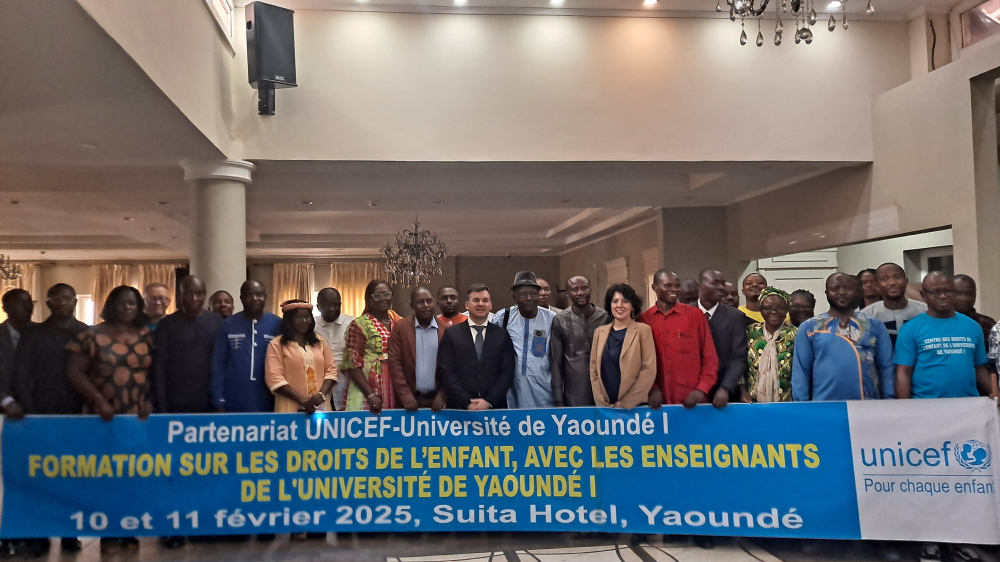
A two-day workshop for participants from the University of Yaounde I opened on February 10, 2025. Organized by UNICEF and the Ministry of Communication.
“This is only the first step of what researchers will be learning. They are the first batch of university lecturers and researchers in the country to undergo the training on child rights. We count so much on them. We hope that the training will result in concrete changes in the situation of child rights promotion in Cameroon,” said Mrs. Nadine Perrault, United Nations Children’s Fund, UNICEF Representative for Cameroon.
Other Workshops Coming Up
She spoke by video call from Douala, Cameroon at the opening of a two-day child rights workshop in Yaounde on Monday, February 10, 2025. Organized by the United Nations Children’s Fund, UNICEF Cameroon office and the Ministry of Communication for lecturers and researchers of the University of Yaounde I. Meanwhile, similar workshops with other Cameroonian universities that have signed Child Rights Centre partnerships with UNICEF will hold in Dschang for the University of Dschang from February 13-14, 2025. And Yaounde for the University of Yaounde II from February 17-18, 2025.
The Suite
“On February 4, 2025, a Child Rights Centre was opened in the University of Yaounde I. It is therefore important for lecturers and researchers to understand what is expected of them. Reason why the training will enable them take into account the first pillar of the International Convention on the Rights of the Child for it to become reality in the University of Yaounde I,” explained Prof. Ndongo Etienne, the Vice Dean of the Faculty of Education in charge of Monitoring of Students, University of Yaounde I.
The Participants
He said participants for the workshop were selected based on one main criterion – first, those who showed interest by attending the unveiling of the inauguration plaque of the Child Rights Centre in the university on February 4, 2025. And others who could not attend the ceremony, but have shown great interest in child rights issues.
“Interest is more important than competence. If you are not interested in something, it will be difficult to perform well even if you are competent. Because the workshop participants are interested in studying child rights, monitoring their work will not be much of a challenge,” Prof. Ndongo assured. “The workshop is a major step in promoting and protecting child rights. The choice of the University of Yaounde I for the creation of child rights centre was not by chance.
Child Rights Convention
“The International Convention on the Protection Child Rights has four pillars: Children should not be discriminated against (Article 2); should have their best interests accounted for as a primary consideration (Article 3). Have the right to survive and develop (Article 6) and have the right to have their views heard and taken seriously (Article 12).
Non-discrimination
“But researchers from the University of Yaounde I will focus on just one of the pillars – non-discrimination, because children have right to all what is due them. We are committed to fight all forms of discrimination against children. Together, we can make a difference in the lives of children and build a stronger world,” Prof. Ndongo Etienne said.
Government Support
“UNICEF commends Cameroonian authorities and universities. A child rights centre was opened in the University of Yaounde I on February 4, 2025 to promote child rights. The training is a follow up to the opening of the child rights centre in the University of Yaounde I. It is important for lecturers - who will carry out the promotion of child rights - to be trained.
Need For Replication
“The training is based on the United Nations International Convention on the Rights of the Child. Our expectation is that as leader in child rights promotion in Central Africa, Cameroon will ensure that each university in the country runs a child rights centre to step up the implementation of the initiative. UNICEF will work closely with universities all through,” promised Dr Leonard Kouadio, Interim UNICEF Cameroon Deputy Representative and Chief of Health and HIV Section, UNICEF Cameroon.
Experiences From Greece, Georgia
“The objective of our presence in Cameroon is the establishment of child rights centres; which has already been done with the University of Yaounde I. We are offering training on child rights and familiarizing workshop participants with the role and functions of Child Rights Centres, based on the experience of Georgia and Greece, where the centres are already running,” said Dr. Eteri Kirtskhalia, Executive Associate with UNICEF Georgia and one of the facilitators of the workshop.
UNICEF’s Vision
“The training includes an understanding of the International Convention on the Rights of the Child and sharing experiences on how child rights centres play a significant role in promoting child rights in Georgia, and the potential of child rights centres to promote the implementation of the Child Rights Convention. Cameroon has ratified the Child Rights Convention and is a State party to the convention. We will share UNICEF’s vision of how child rights centres can support countries in implementing the Child Rights Convention.
Post-training Expectations
“After the training, we expect workshop participants to show greater commitment to child rights promotion. This is only the first training. There will be more in-depth training or better still, a professional development programme which we did in Georgia and plan to carry out in Greece. It will have broader knowledge, insights and information on issues Cameroon faces in terms of child rights,” Dr. Kirtskhalia noted.
Close Collaboration
“That is why the training demands very close cooperation between UNICEF and the University of Yaounde I for UNICEF to provide the professional development programme in terms of relevant knowledge, perspectives of needs and to identify priorities. One of the main advantages of child rights centres is the local content they provide. Child Rights Centres are established in universities, and therefore very close to communities around them; and are therefore in a better position to identify the challenges to be addressed in child rights promotion.
Changing Rights Culture
"UNICEF, with its technical expertise and knowledge, is there to support university lecturers to change the child rights culture. Attitudes towards child rights need to be changed throughout the country. This is why it is important to have child rights centres in every region to serve as ambassadors and the voice of child rights at the regional level. Such centres understand the challenges of the local context and are better placed to address them.
Together With Others
“Again, this is why it is important to sign child rights partnerships with many stakeholders like local governments, municipalities, the private sector…. Child rights centres cannot achieve much alone. This is what we will be sharing during the two-day workshop. It is a programme we are still developing and it is not yet accomplished in any country because it is long-term and results-oriented,” Dr. Kirtskhalia pointed out.
Partnerships With Universities
Child rights education is a fundamental lever for strengthening education systems and promoting a culture of justice, equality and child protection. With this in mind, UNICEF has established strategic partnerships with several Cameroonian universities in order to institutionalize the Child Rights-based Approach in higher education. This initiative aims to train professionals and decision-makers capable of integrating the principles of children's rights into their academic and administrative practices.
Integrating Child Rights
Three training courses with the Universities of Yaounde I, Yaounde II and Dschang constitute significant progress in the implementation of specific agreements signed with these institutions. They aim to equip teachers and administrative staff with the skills required to integrate child rights into their teaching and university management practices.
Workshop Facilitation ...
Cet article complet est réservé aux abonnés
Déjà abonné ? Identifiez-vous >
Accédez en illimité à Cameroon Tribune Digital à partir de 26250 FCFA
Je M'abonne1 minute suffit pour vous abonner à Cameroon Tribune Digital !
- Votre numéro spécial cameroon-tribune en version numérique
- Des encarts
- Des appels d'offres exclusives
- D'avant-première (accès 24h avant la publication)
- Des éditions consultables sur tous supports (smartphone, tablettes, PC)






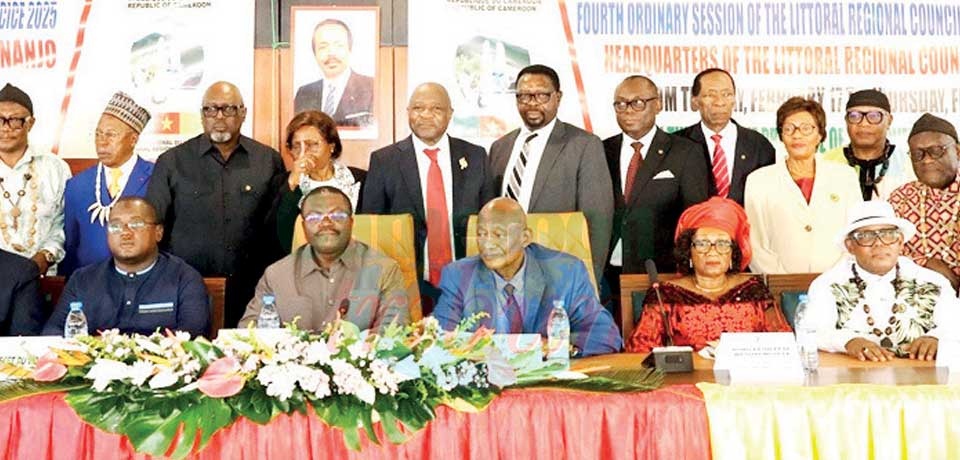
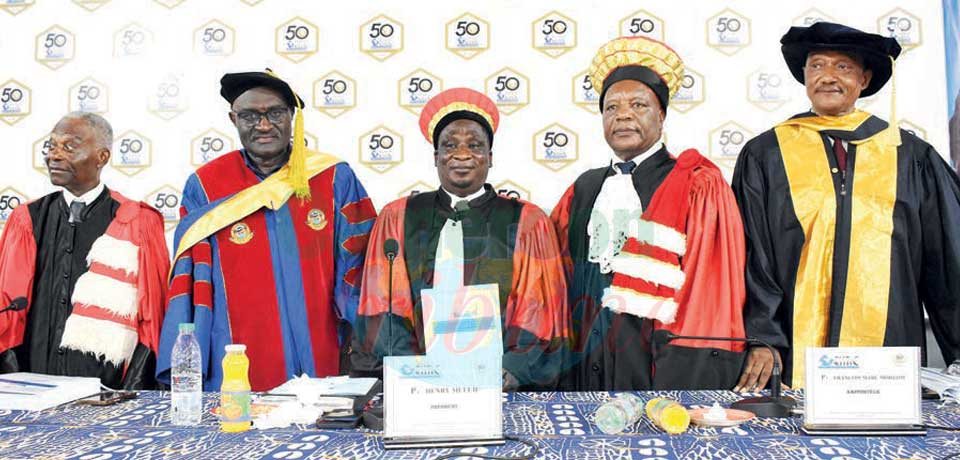
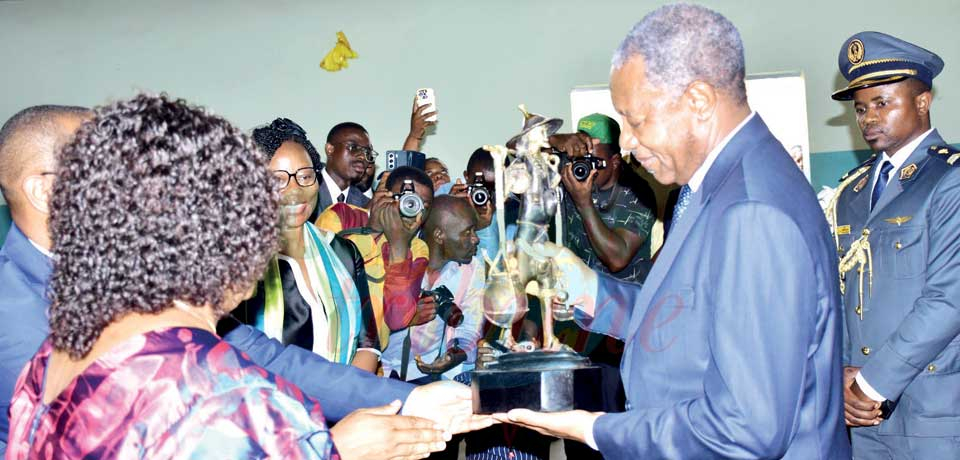
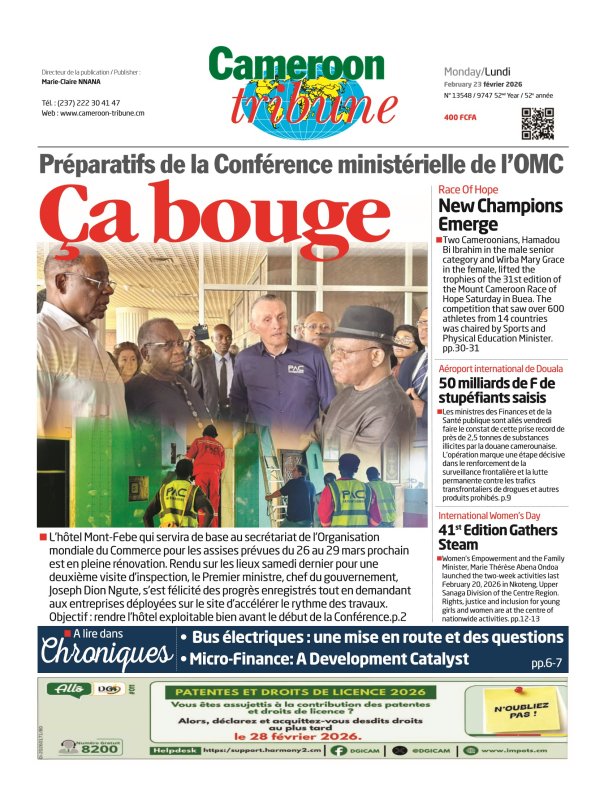




Commentaires